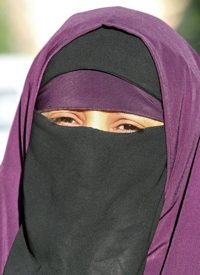
Since France passed legislation earlier this year banning the Islamic burqas, or face-veils, from its streets, the law has engendered a wave of protest. Now, in a show of opposition against the ban, an Islamic Frenchwoman, Kenza Drider, has decided to launch a bid for the French presidency. “When a woman wants to maintain her freedom, she must be bold,” she asserted.
Drider declared her candidacy on Thursday in Meaux, a city outside of Paris which is run by conservative lawmaker Jean-Francois Cope, a leading advocate of the veil ban. Her announcement is not entirely surprising, as she has been an outspoken critic of the ban virtually since its inception. In May, she declared on a local media outlet, “I would rather go to prison than take off the face veil.”
Drider has come to be seen as a champion of Muslim women’s rights, as she has spoken at a number of different conferences focused on “Anti-Muslim Hatred in Britain and Europe.” She has been arrested in France several times for continuing to wear the burqa in public, and has refused “on principle” to pay the resultant fines. She told a British media outlet:
Today Muslim women are considered a non-entity in French society. Here in Britain, I feel like a normal person in the street, whereas in France, I feel like an outsider. It’s really important to show resistance.
In addition to Drider’s endeavor, two Muslim women refused to remove their veils last week and as a result were fined by a French court. All three women are part of a concerted campaign against the legislation.
The two women were fined for purposely wearing their veils in public while attempting to deliver a birthday cake to a French lawmaker. One was charged €120 and the other €80. Those caught wearing veils in public in France can face fines as high as €150.
The women were apparently hoping for a conviction, so that they could take their case to France’s highest court and then the European Court of Human Rights.
Ironically, French president Nicolas Sarkozy contends that the ban against the veils is intended to secure the freedom of Muslim women in France, because the burqas actually imprison them. Most French citizens agree, according to polls. When the ban was first enacted, 74 percent of French citizens supported it.
However, some opponents, such as Roberto Hamza Piccard, spokesman for an Islamic group, contend that the bans will force more devout Muslim women to stay indoors because they are opposed to showing their faces in public. Because of this, Piccard calls the bans “unjust” and claims that they are in violation of “individual liberty.” He adds, “This topic continues to be a sort of criminalization and media dramatization.”
Belgium was the first country to ban burqas. Denis Ducarme, the co-author of the Belgian legislation, explained the reasoning behind it:
Above all, this law was based around the question of security. We think that it is important that all people must be able to be identified when in public. But we are also concerned over women forced to wear [a burqa or niqab]. If the state doesn’t say “stop,” the few wearing them today might be 2,000 in 10 years.
With the largest Muslim population in Europe, France became the next country to enact similar legislation. Those who violate the ban face a fine of nearly $200 and a citizenship-class requirement. Those who force a woman to wear a burqa in public face a significantly larger fine of $20,000 and up to one year in prison.
“There are extremist gurus out there and we must stop their influence and barbaric ideologies,” says Communist Party lawmaker André Gerin. “Covering one’s face undermines one’s identity, a woman’s femininity and gender equality.”
Spain and Italy then followed, enacting similar bans and imposing similar punishments for those in violation. Likewise, other nations, including Denmark, Germany, and the Netherlands, are considering similar bills.
Photo: France’s Kenza Drider, wearing a niqab, during an interview with the Associated Press in Avignon, southern France, Monday, Sept. 13, 2010.: AP Images




